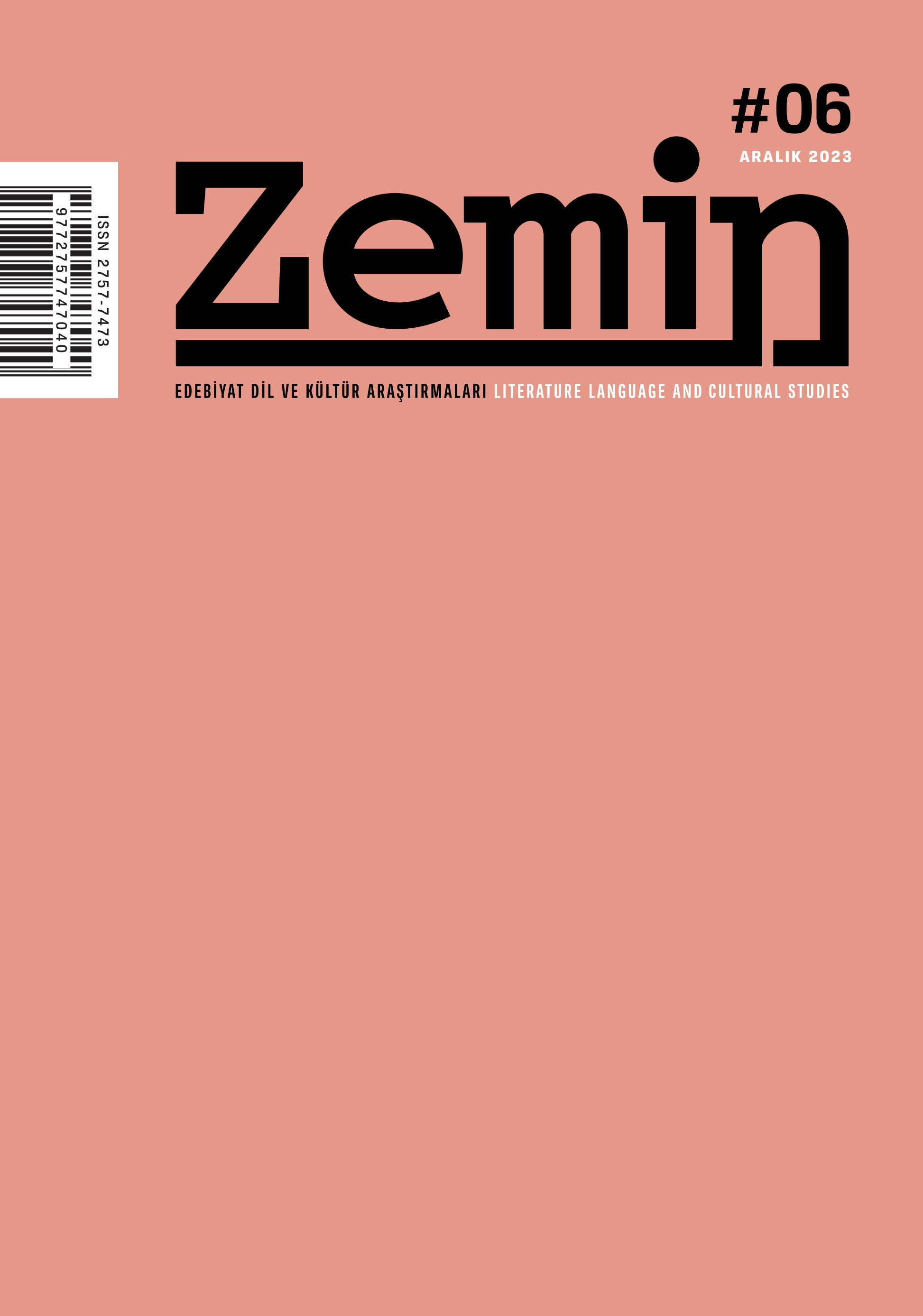Soru Tümceleri İçin İki Boyutlu Bir Anlam Kuramı
DOI:
https://doi.org/10.5281/zenodo.10435936Anahtar Kelimeler:
Sorular, odak, soru eki, Seçenek Anlambilimi, TürkçeÖzet
Bu makale Türkçe soru tümcelerinin Seçenek Anlambilimi çerçevesinde formel bir anlambilimsel incelemesini sunmaktadır. Makale kutupsal, sohbet başlatıcı, seçenekli, dar odak ve öğe soruları için birleşik bir tahlil önermektedir. Bir sorunun bir dizi alternatif önermeyi ifade ettiği varsayılan bu makale, alternatif seçeneklerin odak ve belirsiz zamirler tarafından yerinde üretildiğini ve türetimin noktasal fonksiyon uygulamasıyla gerçekleştiğini ifade etmektedir. Soru parçacığı olarak nitelendirilen MI ekinin aslında belirli bağlamlarda ortaya çıkan bir odak parçacığı olduğu savunulmaktadır. MI’nın tümce içinde yer aldığı alan, üretilen seçeneklerin türünü belirleyerek çeşitli soru tipleri oluşturmaktadır. Makale, ayrıca cevap parçacıklarının neden kutupsal, dar odaklı ve sohbet başlatıcı sorularla kullanılabilirken seçenekli ve öğe sorularıyla kullanılamadığına açıklık getirmektedir.
Referanslar
Aygen, Gülşat. “Q-Particle.” Dil ve Edebiyat Dergisi 4, no. 1 (n.d.).
Beck, Sigrid. “Intervention Effects Follow from Focus Interpretation*.” Natural Language Semantics 14, no. 1 (March 2006): 1-56.
Biezma, María, and Kyle Rawlins. “Responding to Alternative and Polar Questions.” Linguistics and Philosophy 35, no. 5 (October 2012): 361-406.
Bolinger, Dwight. “Yes—No Questions Are Not Alternative Questions.” In Questions, edited by Henry Hiż, 87-105. Dordrecht: Springer Netherlands, 1978. https://doi.org/10.1007/978-94-009-9509-3_3.
Dayal, Veneeta. Questions. First edition. Oxford surveys in semantics and pragmatics 4. Oxford, United Kingdom: Oxford University Press, 2016.
Demirok, Ömer. “Intervention Effects Follow from Scope Rigidity in Turkish.” In Proceedings of SALT 31, edited by Nicole Dreier, Chloe Kwon, Thomas Darnell, and John Starr, 31:82–103, 2022. https://doi.org/10.3765/salt.v31i0.5079.
Dukova-Zheleva, Galina. “Questions and Focus in Bulgarian.” PhD diss., University of Ottawa, 2010.
Farkas, Donka, and Floris Roelofsen. “Polar Initiatives and Polarity Particles in an Inquisitive Discourse Model,” 2012. https://projects.illc.uva.nl/inquisitivesemantics/assets/files/papers/FarkasRoelofsen2012_PolarInitiatives.pdf. (Accessed December 18, 2023).
Gonzalez, Aurore. “Interrogative Particles in Polar Questions: The View from Finnish and Turkish.” Glossa: a Journal of General Linguistics 8, no. 1 (August 16, 2023). https://doi.org/10.16995/glossa.6487. (Accessed September 15, 2023)
Göksel, Aslı, and Celia Kerslake. Turkish: A Comprehensive Grammar. Routledge comprehensive grammars. London: Routledge, 2005.
Hamblin, C. L. “Questions in Montague English.” Foundations of Language 10, no. 1 (1973): 41-53.
Han, Chung-hye, and Maribel Romero. “Negation, Focus and Alternative Questions.” In WCCFL 20: Proceedings of the 20th West Coast Conference on Formal Linguistics, edited by Karine Megerdoomian and Leora Anne Bar-el, 101-114. Somerville, MA: Cascadilla, n.d.
Heim, Irene. “Interrogative Semantics and Karttunen’s Semantics for Know.” In Proceedings of the Israeli Association for Theoretical Linguistics, edited by Rhona Buchalla and Anita Mitwoch, 128-144. Jerusalem, 1994.
Kamali, Beste. “The Question Particle in Turkish: Consequences for the Interfaces.” In Online Complement to Proceedings of WCCFL 28, 2011. https://scholar.google.com.tw/citations?view_op=view_citation&hl=zh-TW&newwindow=1&user=T1pL1aEAAAAJ&citation_for_view=T1pL1aEAAAAJ:u-x6o8ySG0sC. (Accessed December 18, 2023).
Kamali, Beste, and Daniel Büring. “Topics in Questions” Presented at the GLOW 34, Vienna, 2011.
Kamali, Beste, and Manfred Krifka. “Focus and Contrastive Topic in Questions and Answers, with Particular Reference to Turkish.” Theoretical Linguistics 46, no. 1-2 (June 25, 2020): 1–71. https://doi.org/10.1515/tl-2020-0001.
Karttunen, Lauri. “Syntax and Semantics of Questions.” Linguistics and Philosophy 1, no. 1 (January 1977): 3-44.
Kratzer, Angelika, and Junko Shimoyama. “Indeterminate Pronouns: The View from Japanese.” In Contrastiveness in Information Structure, Alternatives and Scalar Implicatures, edited by Chungmin Lee, Ferenc Kiefer, and Manfred Krifka, 91:123-143. Studies in Natural Language and Linguistic Theory. Cham: Springer International Publishing, 2017. http://link.springer.com/10.1007/978-3-319-10106-4_7. (Accessed September 6, 2023).
Krifka, Manfred. “Association with Focus Phrases.” In The Architecture of Focus, edited by Valerie Molnar and Susanne Winkler, 105-136. Berlin: De Gruyter Mouton, 2006.
Krifka, Manfred. “Response Particles as Propositional Anaphors.” Semantics and Linguistic Theory 23 (August 24, 2013): 1-18.
Laka, Itziar. “Negation in Syntax: On the Nature of Functional Categories and Projections.” PhD diss. MIT, 1990.
Li, Haoze, and Jess H.-K. Law. “Alternatives in Different Dimensions: A Case Study of Focus Intervention.” Linguistics and Philosophy 39, no. 3 (June 2016): 201-245.
Rooth, Mats. “A Theory of Focus Interpretation.” Natural Language Semantics 1, no. 1 (1992): 75-116.
Rooth, Mats. “Association with Focus.” PhD diss. UMass-Amherst, 1985.
Rooth, Mats. “Focus.” In The Handbook of Contemporary Semantic Theory, edited by Shalom Lappin, 271-297. Cambridge, Mass., USA: Blackwell Reference, 1996.
Rooth, Mats, and Hongyuan Dong. “A Recursive Phonology Interface for WH-F Alternative Semantics.” Talk presented at the Semantics and Linguistic Theory Conference 21, New Brunswcik, NJ, 2011.
Shimoyama, Junko. “Indeterminate Phrase Quantification in Japanese.” Natural Language Semantics 14, no. 2 (June 2006): 139-173.
Truckenbrodt, Hubert. “An Analysis of Prosodic F-Effects in Interrogatives: Prosody, Syntax and Semantics.” Lingua 124 (January 2013): 131-175.
İndir
Yayınlanmış
Nasıl Atıf Yapılır
Sayı
Bölüm
Lisans
Telif Hakkı (c) 2023 Ümit Atlamaz

Bu çalışma Creative Commons Attribution 4.0 International License ile lisanslanmıştır.



